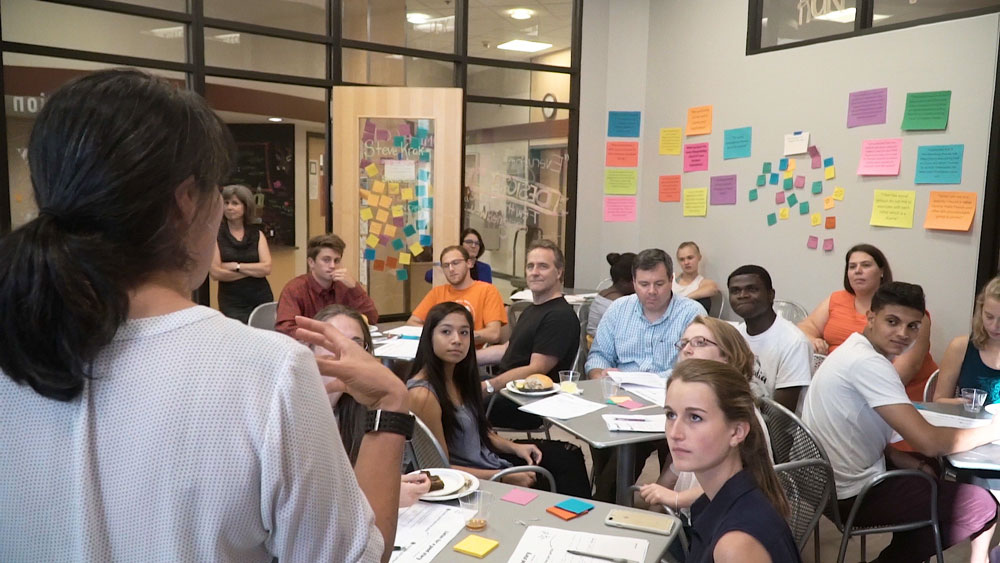Denison University helps students develop the skills that are important in every walk of life, in every graduate and professional program, and in every business or nonprofit. One of the college’s newest initiatives is the “Red Frame Lab,” a dedicated space in the center of campus where students can examine problems and develop solutions. They can work with professional staff and entrepreneurs-in-residence to ask questions, and test and refine solutions. It’s a space to solve problems using design-thinking skills, connect with experts on initiatives, and get great advice about how to bring entrepreneurial ideas to life.
“Design-thinking integrates key liberal arts skills to approach a problem,” said Laurel Kennedy, vice president for student development. “These are skills that have served Denisonians well over time and in all walks of life. We see the lab as a space to deepen the capacities of our students in ways that will help them lead in their communities and their workplaces after Denison. We're doubling down on legacy strengths—but with a new take.”
Design-thinking starts with empathy — to really understand the viewpoint of the people involved. After understanding the viewpoint of others, design-thinking prompts you to ask the right question, which can be harder than you might think. Even straightforward issues hold underlying assumptions that are sometimes at the root of the problem. Then big, fun ideas come, followed by testing and refinement until you arrive at an answer that really addresses the issue, often in surprising ways. Design-thinking is elastic enough to tackle challenges in classroom projects, organizational questions, and even persistent social issues.
“We’ll be better able to understand ourselves and collaborate as a community,” said Summer Aldred ’20. “We can think outside the box and be flexible, and we have the ability to problem-solve and get things done that employers are looking for.”
The new coordinator of the Red Frame Lab is Steve Krak, who has led many communities through design and implementation of new strategies and programs large and small. Krak has an extensive background in facilitation and design process tools as an engineer and education consultant across the U.S. and in Kazakhstan, China and Egypt. He has provided leadership and mentorship to key individuals to help communities navigate implementation, assessment and improvement.
“We’re excited to see so many student groups already using the space,” he said. “Alumni are coming back and using the Red Frame Lab to share their expertise with students. We’re even turning the name into a verb. Now, we ‘red-frame’ a problem.”
Two entrepreneurs-in-residence, Robert Abbott and Lisa Clarke, are also on hand to help students bring their products and ideas to fruition.
Abbott is a communication designer, digital experience strategist and entrepreneur. For more than 30 years he has been innovating brand and communication solutions for a range of respected U.S. and global clients, including John Deere, the Rock and Roll Hall of Fame, Panasonic, Deutsche Bank and the Smithsonian.
Clarke is the director of improvement at the National Board for Professional Teaching Standards, and she co-leads the Network to Transform Teaching (NT3). NT3 is a network of more than 100 schools working to ensure that every student has the opportunity to learn from accomplished teachers. Trained in improvement science by the Institute for Healthcare Improvement, she adapts this methodology for education systems.
“Robert and Lisa are incredible assets to our campus community,” said Julie Tucker, assistant vice president for student development. “They’ve been making their mark out in the world, and they know the challenges and roadblocks that entrepreneurs have to negotiate to be successful. They are great at talking with students about their ideas, and helping them find the right road maps to test their ideas and make them possible.”
“The students bring energy and optimism into the Red Frame Lab,” said Abbott. “They’re smart, excited to learn, and ask really good questions. This is just a really cool place to be, and watch and help these great young adults take an active role in impacting the future.”
